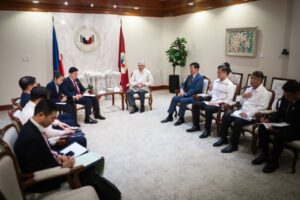Philippine international trade policy and economy gained significantly since the free trade agreement with the European Free Trade Association (EFTA), according to Senate President Pro Tempore Loren Legarda.
The Philippines has maintained its strong foothold in the European market since the EFTA. EFTA States are Switzerland, Norway, Iceland, and Liechtenstein and the agreement entered into force on June 2018.
Legarda, as then Chairperson of the Senate Committee on Foreign Relations, sponsored the measure to ratify the agreement.
“Given the current developments with our cooperation with EFTA states, I am confident that the partnership would be beneficial to our economy. The preference utilization rate of the Philippines continues to improve, from 30% in 2019 to 31% in 2020 as per the Department of Trade and Industry (DTI),” she said.
“We will maximize the benefits from this FTA as we recognize our bilateral trade as a promising tool toward economic recovery and building back better post-COVID pandemic, the global economic recession following the Russia-Ukraine war, and the twin crisis of climate and biodiversity,” Legarda added.
On January 10, 2023, delegations from the Philippines and EFTA member states met in Geneva, Switzerland for its first Joint Committee meeting focused on trade in goods, sustainable development, trade facilitation, and technical cooperation.
DTI Undersecretary Ceferino S. Rodolfo headed the Philippine delegation, while Ms. Karin Büchel, Minister at the Swiss State Secretariat for Economic Affairs, acted as the EFTA spokesperson.
The Philippines was able to secure duty-free market access for all industrial and fisheries tariff lines and significant concessions on agricultural products through the FTA.
In 2020, around EUR 24.84 million worth of Philippine agricultural and industrial products entered the EFTA market. The country exported tunas, desiccated coconuts, fruits and nuts, processed foods and other food preparations, pasta, malt products, vacuum cleaners, new pneumatic tires, and hairdressing apparatus with reduced or zero tariff rates.
The DTI also noted that Switzerland remains the Philippines’ primary partner in the EFTA and has been its regular source of foreign investments in the European region. It said that from 2018 to the third quarter of 2022, the Investment Promotion Agencies (IPA)-approved Swiss investments totalled PhP 1.40 billion in the manufacturing, real estate, and administrative sectors.
From 2018 to the second quarter of 2022, investments from Norway, Iceland, and Liechtenstein amounted to Php 229.4 million in the finance and insurance, manufacturing, administrative, transportation, and storage sectors.
DTI also remarked that the opening of 100% foreign capital in renewable energy projects will pave the way for more investments from EFTA to the Philippines, particularly in the energy sector.
“The DTI would like to convey our utmost appreciation for Sen. Loren Legarda’s leadership in the Senate Committee on Foreign Relations during the ratification of the Philippines-European Free Trade Association Free Trade Agreement (PH-EFTA FTA) in 2018. The EFTA countries have been the country’s steadfast partners, and this important milestone in boosting our strong linkages in the European region was made possible by the senator’s support,” DTI Secretary Fred Pascual said.
The PH-EFTA FTA is the Philippines’ second bilateral FTA next to the Philippines-Japan Economic Partnership Agreement (PJEPA), which officially entered into force on December 2008. As Legarda pointed out, the Philippines is behind compared to other countries in actively engaging other trading partners through FTAs.
“Opening markets through agreements such as the EFTA enables a business environment conducive for investments, and thus, provides opportunities for producers, consumers, and service suppliers alike. We want to promote international trade to help Filipino businesses and MSMEs through the benefits that we get from FTAs,” she said.


